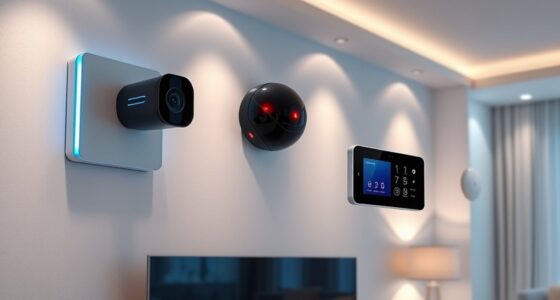To stop your home security system from beeping, first check for immediate risks like door or window breaches. If you see low battery alerts, replace the batteries to end the noise. You can also silence the alarm by entering your unique code or using the status button. Inspect the wiring for any damage or corrosion; faulty connections can cause persistent beeping. If the issue continues, contact your security provider for assistance. By understanding your system's alerts and conducting regular maintenance, you can prevent annoying disturbances in the future. Keep going to uncover more helpful tips!
Key Takeaways
- Replace low batteries in the security system to eliminate persistent beeping, typically every 6 to 12 months.
- Disarm the system using your unique code or utilize the status button to silence alarms without disarming.
- Inspect wiring for corrosion or damage; ensure all connections are secure to prevent malfunctioning alerts.
- Conduct routine maintenance checks, including monthly smoke detector tests, to maintain system functionality and prevent unexpected beeping.
Assess Immediate Risks
First, check for any immediate threats by inspecting your security panel and sounding devices for signs of intrusion or fire. Look for any alerts that might indicate a breach or emergency. If you notice a warning, don't hesitate to contact the authorities. It's imperative to prioritize your safety above all else.
Additionally, just as proper waste management practices are important for maintaining a healthy home environment, making sure your security system is functioning correctly is critical for your peace of mind.
Next, confirm that there are no carbon monoxide leaks, as this can trigger false alarms and cause unnecessary beeping. If everything seems normal, take a moment to evaluate your home for potential security risks. Verify your doors and windows are secure, and confirm that all your safety measures are in place, such as functioning smoke detectors.
Additionally, keep an eye on your security panel for any notifications regarding low battery issues. A low battery can lead to false alarms, so it's important to be proactive in addressing this concern.
Replace Low Batteries

Replacing low batteries is crucial to stop your home security system from beeping persistently. Continuous beeping often indicates that your devices are running low on battery power, so prompt action is needed.
Most home security systems use batteries that last between 3 to 10 years, depending on their type and usage conditions. Common battery types include 6V lantern batteries and 12V lead-acid batteries, so you'll need to identify which ones your system uses. For added convenience, consider using garage door openers with security alerts that notify you when battery levels are low.
Before replacing batteries, it's a good idea to test them with a battery tester. This helps verify they're functioning properly before you take any further steps.
When you're ready to replace batteries, carefully follow the instructions in your user manual. This usually involves removing screws and disconnecting wires from the device, which should be done with caution to avoid damage.
Once you've replaced the batteries, check your home security system to confirm it's functioning correctly and the beeping has stopped. Regular maintenance and battery checks will keep your system in top shape and prevent future disturbances.
Silence the Alarm

To silence the alarm, simply enter your unique code on the keypad to disarm the system. This is the quickest way to stop the beeping.
If you find that the alarm is still sounding, you might try arming the system and then immediately disarming it again; this can often reset the alarm and silence it. Additionally, verify that your security system is regularly maintained, as this can prevent unnecessary malfunctions similar to how what to look for in a home cleaning service can impact service reliability.
Some keypads feature a status button that lets you silence the alarm without fully disarming the system. If your keypad has this option, it's worth utilizing.
Keep in mind that different alarm systems may have unique methods to silence the alarm, so it's vital to consult your user manual for specific instructions tailored to your model.
If these standard methods don't work, don't hesitate to reach out to your security vendor for support. They can provide additional troubleshooting assistance to help you silence the alarm effectively.
Inspect Wiring Issues

When your security system keeps beeping, it's time to inspect the wiring.
Inadequate airflow or electrical failures can lead to system malfunctions, so verifying all components are functioning correctly is essential.
Look for corrosion, check the electrical potential with a voltmeter, and verify all connections are secure.
If you're not experienced with electrical work, it's best to hire a professional electrician to handle the job safely.
Heat pump maintenance can also prevent similar issues in HVAC systems.
Check for Corrosion
Inspecting your security system's wiring for corrosion is important, as it can lead to connectivity issues and trigger false alarms.
Just like choosing the perfect farmhouse sink, guaranteeing the integrity of your wiring is essential for ideal functionality. Corroded wiring disrupts the electrical flow, causing your system to malfunction and beep incessantly. Start by visually checking all exposed wires and connectors for any signs of corrosion, such as discoloration or rust.
If you spot any corroded sections, it's imperative to address them promptly. You can clean minor corrosion with a wire brush or a suitable cleaner, but make sure you turn off the system before you start. For more extensive damage or if you're uncomfortable handling electrical issues, don't hesitate to call a professional electrician. They've the expertise to evaluate and repair your wiring safely.
Regular maintenance of your security system's wiring is essential in preventing future problems. By checking for corrosion and addressing it early, you can maintain ideal performance and avoid those annoying beeping sounds.
Remember that a well-maintained system not only enhances security but also gives you peace of mind. So, make it a habit to inspect your wiring periodically.
Measure Electrical Potential
Measuring the electrical potential in your security system's wiring can help pinpoint any power delivery issues that might be causing those annoying beeps. To start, grab a voltmeter and use it to measure the electrical potential in your system's wiring. This will give you a clear picture of whether the power supply is consistent or if there are fluctuations that could trigger false alarms.
Regular inspections of the wiring can help prevent issues down the line, guaranteeing that your system adheres to high-quality standards for peak performance.
While you're at it, verify that all wiring connections are secure and free from corrosion. Damaged or corroded wiring can lead to malfunctioning alarms, so keeping everything in good shape is essential. It's a good idea to check for wear and tear every few years, especially if your system is older.
Always remember to disconnect the power supply before inspecting or repairing the wiring. This guarantees your safety and minimizes the risk of electrical shock. If you're not comfortable handling electrical systems, consider hiring a professional for thorough inspections. They can identify potential problems and help keep your security system running smoothly.
Hire Professional Electrician
Have you considered hiring a professional electrician to accurately diagnose and fix any wiring issues that might be causing your home security system to beep? Engaging a licensed expert not only guarantees that the problem is addressed correctly and safely, but it can also help prevent potential safety hazards in your home.
Here are a few reasons why you should engage a professional:
- Accurate Diagnosis: Electricians offer diagnostic services that can pinpoint the exact cause of your alarm system beeping, saving you time and frustration.
- Expert Tools: They've the experience and tools necessary to inspect and repair corroded or damaged wiring, which could be causing persistent issues.
- Safety Compliance: A professional electrician will check for proper connections and voltage levels, guaranteeing compliance with safety standards and codes.
- Peace of Mind: Knowing that a knowledgeable expert is handling your wiring issues provides reassurance that everything is being addressed according to best practices.
For additional tips on maintaining a safe home environment, consider Aging With Dignity – In-Home Care Tips
Reach Out to Provider

If troubleshooting hasn't stopped the beeping, it's time to reach out to your security provider for expert help. A professional service can effectively address persistent beeping that DIY methods couldn't resolve. Your security provider may offer troubleshooting over the phone, which can save you time. In some cases, they might need to send a technician to your home for a hands-on assessment.
Make certain you have your contact information updated with your provider to guarantee timely support. Here's a quick reference table to help you when reaching out:
| Action | Description | Tips |
|---|---|---|
| Call Support | Discuss the issue with a representative | Have your system details ready |
| Schedule a Visit | If needed, arrange for a technician visit | Ensure they have access |
| Provide Details | Explain the troubleshooting steps you've tried | Be clear and concise |
| Follow Up | Check in if the problem persists | Stay proactive |
| Keep Records | Document your communications | Note any advice given |
Don't let persistent beeping disrupt your peace of mind—contact your provider today!
Understand Alarm Behaviors

Understanding how your alarm system behaves can help you quickly identify the cause of that irritating beeping. Alarm systems often produce beeping sounds for specific reasons, and recognizing these can save you time and frustration.
Here are four common causes of beeping:
- Low Battery: Continuous low beeping usually indicates that the system's backup battery is running low. This is a sign that you need to replace it soon.
- Power Interruptions: If there's been a power outage, the system may beep to alert you that the battery is discharging. Check your power supply and connections.
- Smoke Detectors: Your smoke detectors might also be responsible for the beeping. These devices often signal low battery levels or the need for maintenance.
- User Manual Guidance: Always refer to your alarm system's user manual for specific beeping codes. This manual provides essential information on what each beep means and how to resolve it.
Maintenance for Future Prevention

To keep your home security system from beeping in the future, you need to establish a regular battery replacement schedule and conduct routine maintenance checks.
This way, you can catch potential issues before they become a hassle.
Staying proactive about your system's care guarantees it runs smoothly and alerts you only when necessary.
Regular Battery Replacement Schedule
Establishing a regular battery replacement schedule is crucial for keeping your home security system running smoothly and avoiding unnecessary beeping. By planning ahead, you can prevent interruptions and guarantee peak performance. Here's how to set up an effective maintenance schedule:
- Replacement Frequency: Aim to replace batteries every 6 to 12 months, depending on your system's usage and specifications.
- Monitor Lifespan: Keep track of the age of your batteries. Most backup batteries last between 3 to 10 years, so plan replacements accordingly.
- Choose Quality Batteries: Use only quality batteries, such as 6V lantern or 12V lead-acid types, as recommended by your security system manufacturer for the best results.
- Test Regularly: Use a battery tester to check charge levels. Replace any batteries that show signs of depletion to maintain system integrity.
Document your battery replacement dates and set reminders on your calendar to stay on top of this maintenance schedule. By taking these steps, you'll help guarantee your security system remains reliable and free from annoying beeping.
Routine System Maintenance Checks
Regular maintenance checks are essential for ensuring your home security system operates smoothly and prevents annoying beeping.
Start by scheduling regular battery checks for all components of your system. Since batteries typically last between 3 to 10 years, keeping an eye on their status will help avoid low battery alerts.
Next, conduct routine wiring inspections to look for signs of corrosion or damage, as faulty wiring can lead to persistent beeping and system malfunctions.
Don't forget about your smoke detectors; test them monthly to make sure they're operational. Malfunctioning smoke detectors can trigger unwanted beeping, so it's vital to keep them in good shape.
To stay organized, document all maintenance activities in a maintenance log. This will help you identify patterns and prevent future issues.
Backup Battery Insights

Understanding your backup battery's role is vital for maintaining a silent home security system and preventing unexpected beeping. Backup batteries are essential for alarm systems, guaranteeing they function during power outages. However, if these batteries fail or lose charge, they can start beeping, signaling a need for replacement or maintenance.
Here are four key insights to help you manage your backup batteries effectively:
- Lifespan: Backup batteries typically last between 3 to 10 years. Keep an eye on their age and replace them as needed.
- Types: Common types include 6V lantern batteries and 12V lead-acid batteries. Be certain you know which type your system uses for proper replacement.
- Testing: Alarm systems conduct daily tests to check battery functionality. Regularly review these alerts to catch issues early.
- Replacement Process: When it's time for a replacement, carefully remove screws and disconnect wires to guarantee safety.
Troubleshooting Monitoring Services

If your backup battery is in good shape but your home security system keeps beeping, it might be time to troubleshoot your monitoring services for potential issues.
Monitoring services should notify you about low battery conditions and other system alerts to prevent that annoying beeping. If you're not receiving these alerts, check to verify your contact information is up to date with your alarm company. This verifies you get timely notifications regarding any system issues.
When you encounter persistent beeping, don't hesitate to reach out to your monitoring service for troubleshooting assistance. They can help you identify the root cause, whether it's a malfunctioning sensor or a software issue. Some alarm companies even offer automatic alerts that provide real-time updates on your system's status, enhancing your awareness.
Regular communication with your alarm monitoring provider is key. It can help identify any necessary service improvements and verify your system remains functional and effective.
Frequently Asked Questions
How Do I Get My Security System to Stop Chirping?
If your security system's chirping is bothering you, check the batteries first. Replace any low ones, disarm the system with your code, and inspect the wiring if it continues. Regular maintenance can help avoid future issues.
How to Stop a House Alarm From Beeping?
To stop your house alarm from beeping, check for low batteries and replace them. Disarm the system with your code, inspect wiring for damage, and contact your provider if the issue persists. Regular maintenance helps too.
How Do I Get My Alarm to Stop Beeping Every 30 Seconds?
To stop your alarm from beeping every 30 seconds, check the batteries in the control panel and detectors. If it persists, inspect for wiring issues and consult your manual for specific troubleshooting steps.
How Do I Mute My Security Alarm?
To mute your security alarm, simply disarm it using your unique code. Don't worry if it keeps beeping; try arming and disarming again. Check your manual for model-specific instructions if needed.
Conclusion
In conclusion, staying smart and savvy about your home security system can save you from annoying alerts. Regularly reviewing and updating your security settings can help ensure that your system functions smoothly without unnecessary interruptions. If you find that a particular setup is causing too many false alarms, it might be a good idea to remove Honeywell home security system components that are no longer needed or functioning optimally. By fine-tuning your configuration, you can achieve a balance between safety and convenience.
By addressing immediate issues, replacing low batteries, and understanding alarm behaviors, you can create a calm and secure sanctuary.
Don't hesitate to reach out for help if needed; it's better to seek support than to suffer in silence.
With proper maintenance and proactive practices, you'll guarantee peace of mind and a perfectly peaceful home.









